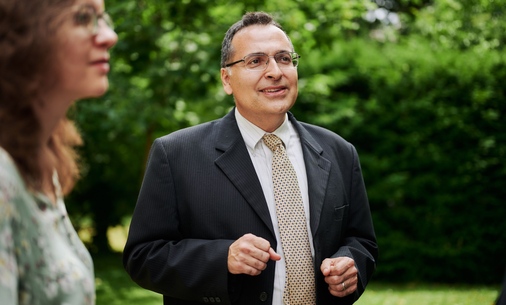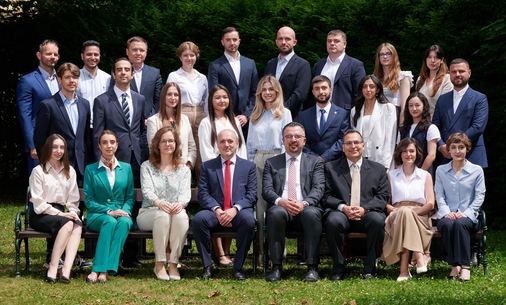Interview with Patrick Imam, Departing Deputy Director of the JVI
July 16, 2025
Patrick Imam has been the JVI Deputy Director for the last four years. As he prepares to return to the IMF in Washington D.C., we spoke with him about the evolution of the JVI, the challenges and opportunities of the past four years, and what made this assignment so unique.
Can you give us an overview of your role and responsibilities as Deputy Director at the JVI?
In practice, being Deputy Director means wearing many hats. One is a strategic advisor, institutional ambassador, curriculum designer, and occasionally, logistical firefighter. But at the heart of it, my job is to help ensure that the JVI remains relevant, agile, and impactful, an institution that not only delivers world-class training, but also anticipates where economic thinking and policy needs are heading. This is why we for instance developed two AI related courses for this year, one geared to central banks and one to finance ministries.
This requires working closely with our partners, from the IMF and the Austrian authorities to other international organization and national central banks to align on goals, to streamline delivery, and to respond in real time to shifting priorities. Every week presented new challenges, but that is what made the role exciting.
How has the curriculum at the JVI evolved over these 4 years?
These four years were, in a word, extraordinary. When I joined in 2021, we were still in the middle of the pandemic, trying to teach macroeconomic policy while global GDP was just recovering and borders were still quite tight. Now, I am leaving as policymakers are navigating the rise of Artificial Intelligence and debating how it might transform growth, labor markets, and inequality.
Naturally, our curriculum had to evolve with the times. We kept our macroeconomic core, from monetary, fiscal, and financial policy, but added new layers as they were becoming central to sound policymaking in the region.: green finance, digital currencies, fintech, and others.
We also adapted the mode of delivery. Hybrid and blended delivery models were developed, cohort training was introduced, and greater use of case-based learning and workshops became part of the new normal. The result is a curriculum that is broader, more inclusive, and more aligned with the challenges of today and tomorrow.
What is the change you are most proud of?
One of the most meaningful developments during my time at the JVI has been the shift toward greater regional ownership in how we deliver training. In recent years we have seen a reversal of the traditional flow of knowledge. Former participants are returning as instructors, and institutions like the National Bank of Poland and the National Bank of Slovakia, to name just two, are now co-delivering courses. This shift has been transformative. It reflects the growing policy expertise within the region, gives participants access to highly relevant experience, and strengthens the credibility and relatability of our training.
It also reflects a broader shift, namely the emergence of a true policy community. When trainees become trainers, the message is unmistakable: capacity development is not a one-off intervention, but a sustained continuum. This evolution fosters national ownership, strengthens peer learning, and encourages institutions to view themselves not merely as recipients of support, but also as active contributors to regional progress.
How would you describe your experience at the JVI? What makes the JVI special?
My time at the JVI has been both intellectually stimulating and professionally rewarding. Though modest in size, the JVI has a wide-reaching footprint, positioned at the crossroads of technical expertise, regional insight, and global policy thinking. And the JVI is more than a training institute; it serves as a platform for meaningful exchange across borders, institutions, and professional experiences. It translates complex economic debates into practical, actionable tools for policymakers throughout the region.
What truly sets the JVI apart is its people. The staff is diverse, dedicated, and deeply committed to the Institute’s mission. Our participants bring not only a strong motivation to learn, but also firsthand policy experience, often from environments where decisions carry significant consequences. This creates a learning environment that is both intellectually rigorous and firmly rooted in real-world challenges.
What I found especially meaningful was witnessing our work put into practice. Alumni have shared how courses at the JVI helped shape real policy decisions, from fiscal reforms to supervisory frameworks. That kind of direct and lasting impact is rare, and it speaks of the continued relevance and value of what we do.
Any funny story you would like to share?
One of the most memorable moments came during the International Evening of the Applied Economic Policy course, which is a cherished tradition where participants bring food from their home countries. The classroom quickly turned into a vibrant buffet: traditional food from Central Europe, fragrant dishes from Central Asia, savory pastries from the Balkans, colorful salads from the Caucasus, and sweet treats from across the region. It was a feast that reflected the diversity of our participants and their pride in sharing a taste of home.
As the evening unfolded, the food sparked lively conversations, about family traditions, regional customs, and the stories behind each dish. Participants exchanged memories as easily as they shared plates, discovering common ground across borders. The atmosphere quickly shifted to genuine connection, filled with laughter and a shared sense of curiosity.
By the end of the night, the room was buzzing, and new friendships had taken root. It was a perfect reminder that, much like good policy, good food brings people together, and that some of the most lasting lessons happen not during lectures, but over dessert.
After 4 years of living in Vienna, you will return to the IMF. What are you looking forward to? And what will you miss most?
Returning to Washington at a time of rapid global change presents a timely opportunity to reengage with pressing macroeconomic challenges. The policy landscape will be broader, the questions perhaps more complex, and the stakes often higher.
Yet leaving Vienna will be bittersweet. The city’s elegant blend of history, culture, and modernity, paired with a deep appreciation for thoughtful living, resonates well with Vienna consistently ranking among the world’s most livable cities. Over the past four years, I have come to feel at home here.
What I will miss most, however, is the JVI. The richness of perspectives brought by our diverse participants, the dedication and professionalism of the team, and the constant exchange of ideas across borders created an intellectually vibrant and uniquely collegial environment. It is rare to find such a strong sense of mission delivered with such spirit and generosity.
This assignment spanned two global inflection points, the COVID-19 pandemic, which tested our collective resilience, and the rise of artificial intelligence, which is reshaping the very foundations of economic policy. Helping to guide the JVI through this period was both challenging and rewarding, an experience I will carry with me, both professionally and personally, for years to come.
Rilind Kabashi, Senior Economist and Newsletter Editor, JVI











